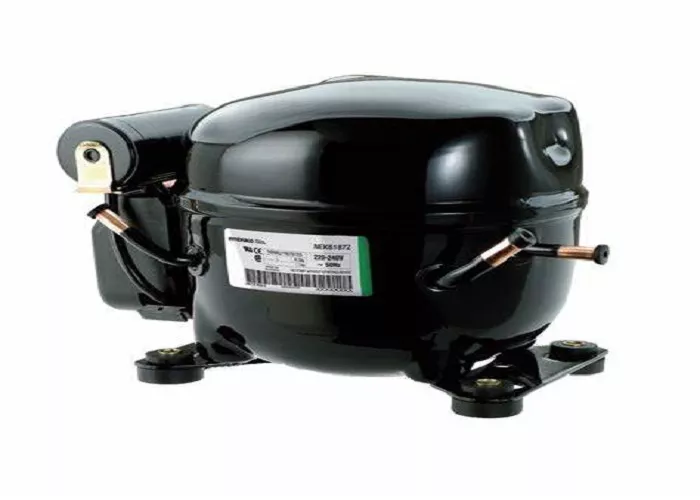The refrigerator is one of the most essential appliances in modern households, playing a crucial role in food preservation. Over the years, advancements in refrigeration technology have led to significant improvements in energy efficiency, noise reduction, and cooling performance. One of the most notable innovations in this field is the inverter compressor. Unlike traditional compressors, inverter compressors offer superior efficiency, longer lifespan, and quieter operation.
What is a Compressor in a Refrigerator?
Role of the Compressor
- It compresses low-pressure refrigerant gas into high-pressure gas.
- The high-pressure gas moves to the condenser, where it releases heat and turns into a liquid.
- The liquid refrigerant then passes through an expansion valve, reducing pressure and temperature.
- Finally, it absorbs heat from the refrigerator’s interior, cooling it down before returning to the compressor to repeat the cycle.
Types of Compressors
Fixed-Speed (Conventional) Compressor
- Operates at a constant speed, either fully ON or OFF.
- Starts and stops frequently to maintain temperature.
- Consumes more power due to frequent high-current startups.
Inverter Compressor
- Adjusts its speed dynamically based on cooling demand.
- Runs continuously at varying speeds.
- More energy-efficient and quieter.
What is an Inverter Compressor?
An inverter compressor is an advanced type of compressor that uses variable-speed technology to adjust cooling performance based on real-time demand. Unlike conventional compressors that operate at fixed speeds, inverter compressors can speed up or slow down as needed.
How Does an Inverter Compressor Work?
Continuous Operation
- Instead of turning ON/OFF repeatedly, the inverter compressor runs continuously at lower speeds when cooling demand is low.
- This eliminates the high power surges associated with conventional compressors.
Precise Temperature Management
- The inverter system monitors temperature fluctuations in real-time and adjusts compressor speed accordingly.
- This results in more stable temperatures inside the fridge, improving food preservation.
Key Components of an Inverter Compressor System
| Component | Function |
|---|---|
| Inverter Circuit | Adjusts motor speed by varying electrical frequency. |
| Variable-Speed Motor | Runs at different RPMs (Revolutions Per Minute) based on cooling needs. |
| Microcontroller (MCU) | Processes temperature data and controls compressor speed. |
| Sensors | Monitor internal fridge temperature and external conditions. |
Advantages of Inverter Compressors
Inverter compressors offer several benefits over traditional fixed-speed compressors.
Energy Efficiency
- Reduces power consumption by 20-40% compared to conventional compressors.
- Avoids frequent high-power startups (which consume more electricity).
- Runs at low speeds when cooling demand is minimal, saving energy.
Quieter Operatior
- Since the compressor doesn’t turn ON/OFF abruptly, it produces less noise.
- Operates at lower decibel levels (as low as 38 dB), making it ideal for open kitchens.
Longer Lifespan
- Reduced mechanical stress due to smooth speed transitions (no sudden starts/stops).
- Fewer wear-and-tear issues, leading to a longer-lasting compressor.
Disadvantages of Inverter Compressors
- Requires specialized technicians for repairs due to the inverter circuit and microcontroller.
- Replacement parts may be costlier than those for fixed-speed compressors.
Inverter vs. Conventional Compressor: A Comparison
| Feature | Inverter Compressor | Conventional Compressor |
|---|---|---|
| Speed Control | Variable speed (adjusts RPM) | Fixed speed (ON/OFF only) |
| Energy Efficiency | High (20-40% savings) | Lower (due to frequent startups) |
| Noise Level | Quieter (38-42 dB) | Louder (45-50 dB) |
| Temperature Stability | More stable | Fluctuates more |
| Lifespan | Longer (less wear) | Shorter (more mechanical stress) |
| Initial Cost | Higher | Lower |
| Maintenance | Requires expert service | Easier to repair |
Applications of Inverter Compressors
- Domestic refrigerators (especially high-end models).
- Commercial refrigeration (supermarkets, cold storage).
- Air conditioners (inverter ACs are highly efficient).
Future of Inverter Compressors
- AI-based cooling optimization (smart fridges that learn usage patterns).
- More durable and quieter designs.
- Integration with renewable energy systems (solar-powered refrigerators).
Conclusion
Inverter compressors represent a significant leap in refrigeration technology. They offer better energy efficiency, quieter operation, longer lifespan, and superior cooling performance compared to traditional compressors. While they come at a higher initial cost, the long-term savings in electricity bills and maintenance make them a wise investment.
For consumers looking for a modern, eco-friendly, and high-performance refrigerator, an inverter compressor model is the best choice. As technology continues to evolve, we can expect even more advanced and efficient cooling solutions in the future.

